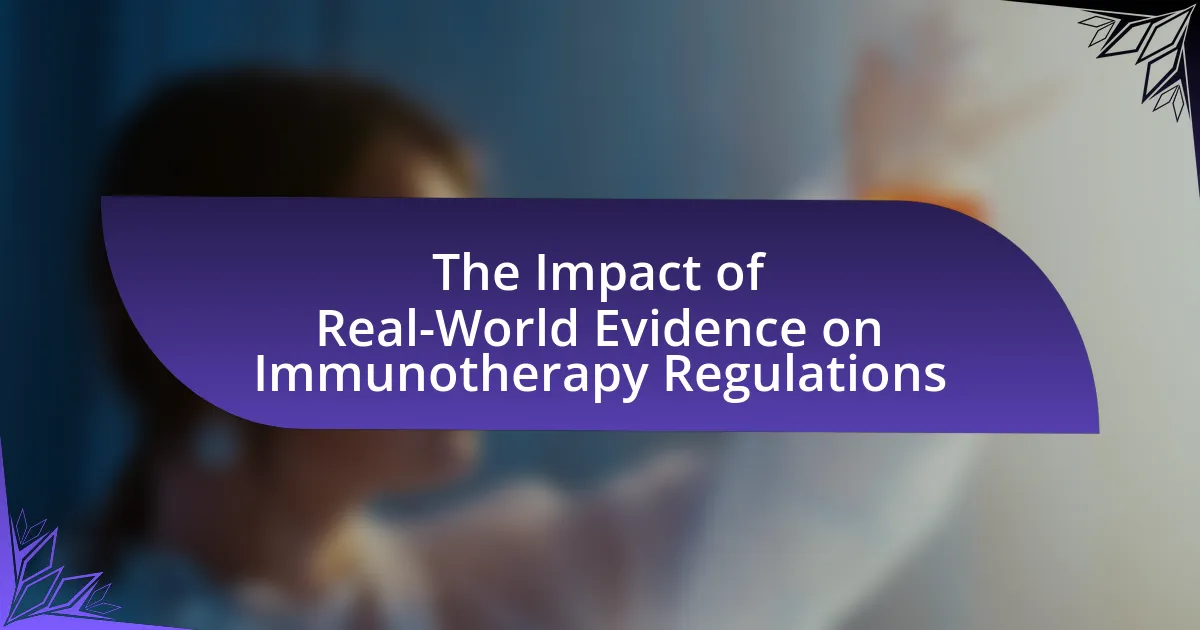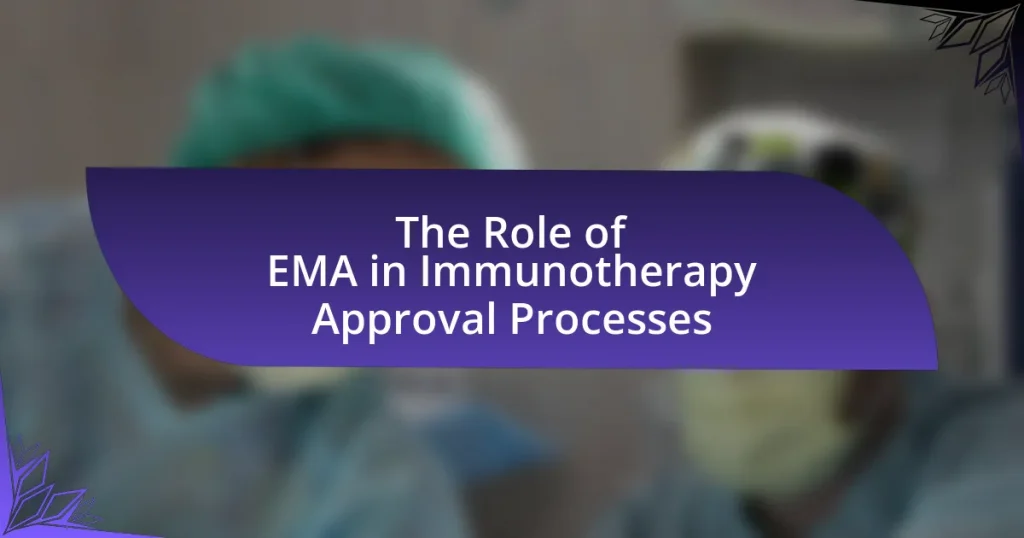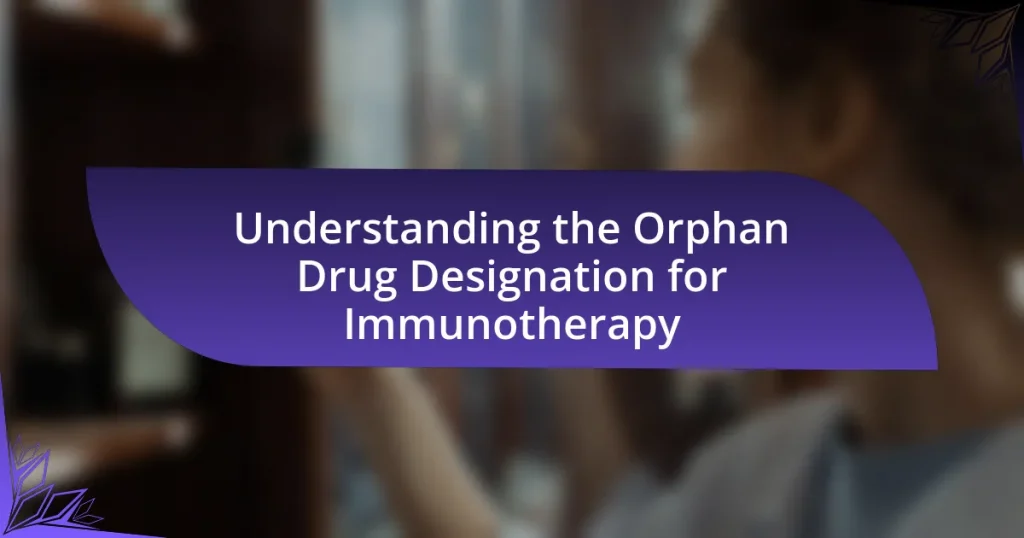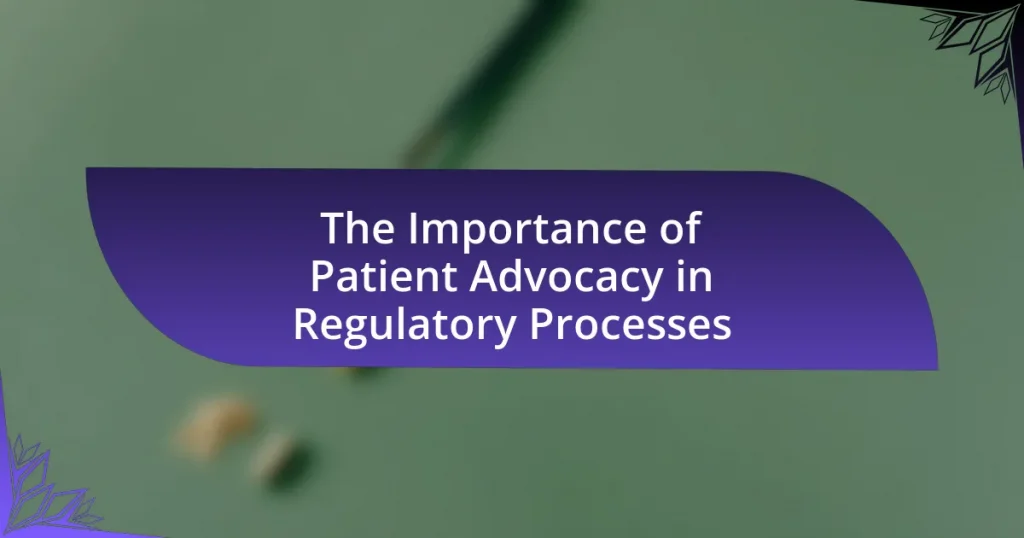The article examines the impact of Real-World Evidence (RWE) on immunotherapy regulations, highlighting its role in informing regulatory decisions by providing data on treatment effectiveness and safety in diverse patient populations outside clinical trials. It discusses how regulatory agencies, such as the FDA and EMA, are increasingly incorporating RWE into their frameworks to enhance drug approvals and post-marketing surveillance. Key topics include the types of RWE considered, the challenges of integrating RWE into regulatory processes, and the ethical considerations involved. The article also explores future trends, the influence of technology on data collection, and best practices for utilizing RWE in immunotherapy regulations.
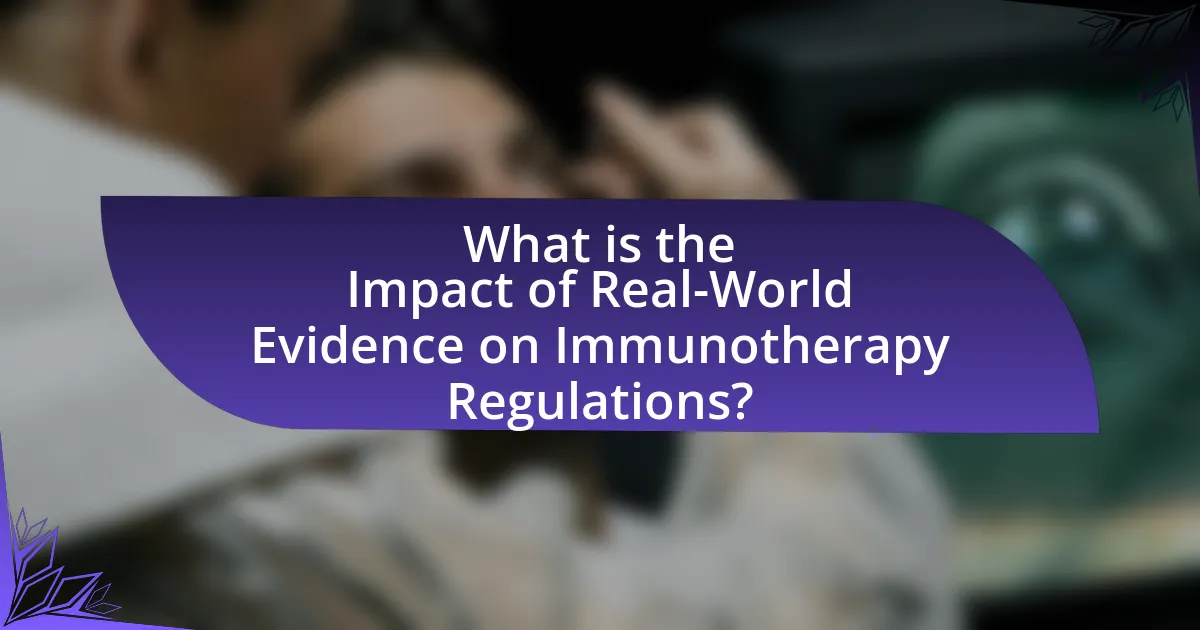
What is the Impact of Real-World Evidence on Immunotherapy Regulations?
Real-world evidence significantly influences immunotherapy regulations by providing data on treatment effectiveness and safety in diverse patient populations outside of clinical trials. Regulatory agencies, such as the FDA and EMA, increasingly incorporate real-world evidence to support drug approvals, label expansions, and post-marketing surveillance. For instance, the FDA’s Real-World Evidence Program aims to enhance the understanding of how therapies perform in routine clinical settings, which can lead to more informed regulatory decisions. This shift towards utilizing real-world data helps ensure that immunotherapies are not only effective in controlled environments but also in broader, real-life scenarios, ultimately improving patient outcomes and safety monitoring.
How does Real-World Evidence influence regulatory decisions in immunotherapy?
Real-World Evidence (RWE) significantly influences regulatory decisions in immunotherapy by providing data on treatment effectiveness and safety in diverse patient populations outside of clinical trials. Regulatory agencies, such as the FDA and EMA, utilize RWE to supplement clinical trial data, enabling them to assess the real-world performance of immunotherapies, which can lead to more informed approval decisions and post-marketing surveillance. For instance, the FDA’s Real-World Evidence Program aims to integrate RWE into regulatory frameworks, allowing for adaptive pathways that can expedite access to innovative therapies while ensuring patient safety. This approach is supported by studies demonstrating that RWE can reveal long-term outcomes and rare adverse events that may not be captured in traditional clinical trials, thereby enhancing the overall understanding of immunotherapy’s impact in real-world settings.
What types of Real-World Evidence are considered in immunotherapy regulations?
Real-World Evidence (RWE) considered in immunotherapy regulations includes observational studies, patient registries, and real-world data from electronic health records. Observational studies provide insights into treatment effectiveness and safety in diverse populations outside clinical trials. Patient registries collect data on patient outcomes and experiences, helping to assess long-term effects of immunotherapy. Real-world data from electronic health records offers comprehensive information on patient demographics, treatment patterns, and outcomes, which regulatory bodies utilize to inform decision-making and evaluate the benefit-risk profile of immunotherapies.
How do regulatory bodies assess the validity of Real-World Evidence?
Regulatory bodies assess the validity of Real-World Evidence (RWE) through a systematic evaluation of data quality, relevance, and methodological rigor. They examine the sources of RWE, such as electronic health records, insurance claims, and patient registries, ensuring that these data sources are reliable and representative of the population. Additionally, regulatory agencies like the FDA and EMA require that RWE studies adhere to established guidelines, such as those outlined in the FDA’s Framework for Real-World Evidence, which emphasizes the importance of study design, statistical analysis, and the ability to minimize bias. This rigorous assessment process is crucial for determining the applicability of RWE in supporting regulatory decisions regarding the safety and efficacy of treatments, particularly in the context of immunotherapy regulations.
Why is Real-World Evidence important for immunotherapy development?
Real-World Evidence (RWE) is crucial for immunotherapy development because it provides insights into treatment effectiveness and safety in diverse patient populations outside of controlled clinical trials. RWE helps identify how immunotherapies perform in real-world settings, revealing variations in patient responses due to factors like comorbidities and demographic differences. For instance, studies have shown that RWE can uncover long-term outcomes and adverse effects that may not be evident in clinical trials, thereby informing regulatory decisions and clinical guidelines. This evidence supports the optimization of treatment protocols and enhances patient care by ensuring that therapies are effective across various populations.
What role does Real-World Evidence play in patient outcomes?
Real-World Evidence (RWE) significantly enhances patient outcomes by providing insights into the effectiveness and safety of treatments in everyday clinical settings. RWE is derived from data collected outside of traditional clinical trials, such as electronic health records, insurance claims, and patient registries, allowing for a more comprehensive understanding of how therapies perform in diverse populations. Studies have shown that RWE can identify treatment benefits and risks that may not be evident in controlled trial environments, thereby informing clinical decision-making and regulatory approvals. For instance, the FDA has increasingly utilized RWE to support the approval of new therapies, demonstrating its critical role in shaping treatment guidelines and improving patient care.
How does Real-World Evidence contribute to the understanding of treatment effectiveness?
Real-World Evidence (RWE) enhances the understanding of treatment effectiveness by providing data on how therapies perform in everyday clinical settings, outside of controlled clinical trials. RWE captures diverse patient populations, varying disease states, and real-life treatment adherence, which are often not represented in clinical trials. For instance, studies have shown that RWE can reveal differences in treatment outcomes based on demographic factors, comorbidities, and patient preferences, thereby offering a more comprehensive view of a treatment’s effectiveness. This evidence is crucial for regulatory bodies, as it informs decision-making regarding the approval and reimbursement of therapies, ensuring that treatments are not only effective in theory but also in practice.
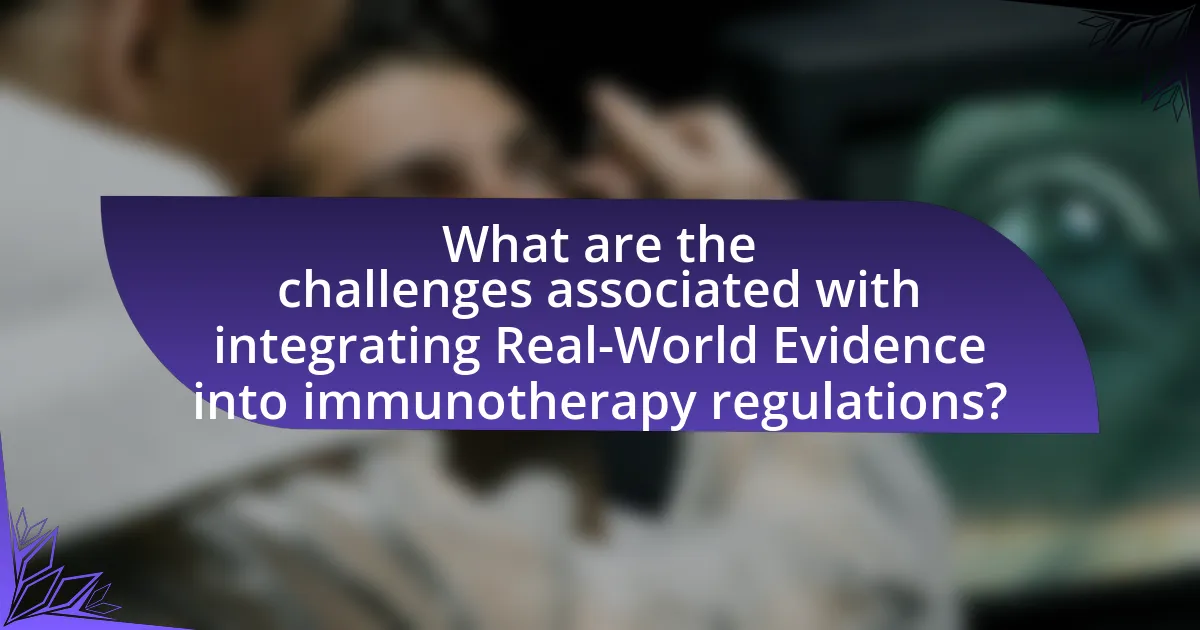
What are the challenges associated with integrating Real-World Evidence into immunotherapy regulations?
Integrating Real-World Evidence (RWE) into immunotherapy regulations faces several challenges, primarily related to data quality, regulatory acceptance, and methodological rigor. Data quality issues arise from the variability in data sources, such as electronic health records and patient registries, which may lack standardization and completeness. Regulatory acceptance is hindered by the need for clear guidelines on how RWE can complement traditional clinical trial data, as agencies like the FDA and EMA have yet to establish comprehensive frameworks for its use. Methodological rigor is essential, as RWE studies must demonstrate robust statistical analyses and minimize biases to be considered valid for regulatory decisions. These challenges underscore the complexity of integrating RWE into existing regulatory frameworks while ensuring patient safety and treatment efficacy.
What obstacles do regulatory agencies face when evaluating Real-World Evidence?
Regulatory agencies face several obstacles when evaluating Real-World Evidence (RWE), primarily related to data quality, variability, and integration. The quality of RWE can be inconsistent due to differences in data sources, such as electronic health records, insurance claims, and patient registries, which may lack standardization. Variability in patient populations and treatment protocols complicates the interpretation of RWE, making it challenging to draw definitive conclusions about efficacy and safety. Additionally, integrating RWE with traditional clinical trial data poses difficulties, as regulatory frameworks are often designed around randomized controlled trials, which have different methodological rigor. These challenges hinder the ability of regulatory agencies to make informed decisions based on RWE, impacting the approval and monitoring of immunotherapies.
How do data quality and reliability impact regulatory assessments?
Data quality and reliability significantly influence regulatory assessments by determining the validity and trustworthiness of the evidence presented. High-quality data ensures that regulatory bodies can make informed decisions regarding the safety and efficacy of immunotherapies, as seen in the FDA’s reliance on robust clinical trial data and real-world evidence to evaluate new treatments. For instance, the FDA’s approval of the CAR-T cell therapy Kymriah was supported by comprehensive data demonstrating its effectiveness and safety, highlighting the critical role of reliable data in regulatory processes.
What are the ethical considerations in using Real-World Evidence?
The ethical considerations in using Real-World Evidence (RWE) include patient privacy, informed consent, data integrity, and potential biases. Patient privacy is paramount, as RWE often utilizes sensitive health data; thus, compliance with regulations like HIPAA is essential to protect individual identities. Informed consent is critical, as patients should be aware of how their data will be used in research and decision-making processes. Data integrity must be maintained to ensure that the evidence is reliable and accurately reflects real-world scenarios, which can be compromised by incomplete or biased data collection methods. Additionally, potential biases in data selection and interpretation can lead to skewed results, affecting the validity of conclusions drawn from RWE. These ethical considerations are vital to uphold trust in the healthcare system and ensure that RWE contributes positively to patient outcomes and regulatory decisions.
How can stakeholders address these challenges?
Stakeholders can address the challenges of integrating real-world evidence into immunotherapy regulations by collaborating to establish standardized data collection methods. This collaboration can enhance the quality and consistency of real-world evidence, making it more reliable for regulatory decision-making. For instance, the FDA has emphasized the importance of real-world data in its 2021 framework for real-world evidence, highlighting that consistent methodologies can lead to better assessments of treatment effectiveness and safety. By working together, stakeholders can also advocate for regulatory guidelines that support the use of real-world evidence, ensuring that it is recognized as a valid component of the evidence base for immunotherapy approvals.
What best practices can be implemented for data collection and analysis?
Best practices for data collection and analysis include ensuring data quality, employing standardized methodologies, and utilizing appropriate statistical techniques. Ensuring data quality involves validating data sources and implementing data cleaning processes to eliminate inaccuracies. Employing standardized methodologies, such as using consistent data collection instruments and protocols, enhances comparability and reliability across studies. Utilizing appropriate statistical techniques, including regression analysis and machine learning algorithms, allows for robust interpretation of data patterns and relationships. These practices are supported by research indicating that high-quality data collection and analysis significantly improve the validity of findings in studies related to real-world evidence and immunotherapy regulations.
How can collaboration between stakeholders enhance the use of Real-World Evidence?
Collaboration between stakeholders enhances the use of Real-World Evidence (RWE) by facilitating data sharing, aligning research priorities, and improving the quality of evidence generated. When pharmaceutical companies, healthcare providers, regulatory agencies, and patients work together, they can pool diverse data sources, leading to more comprehensive insights into treatment effectiveness and safety. For instance, a study published in the Journal of Clinical Oncology highlighted that collaborative efforts in data collection and analysis resulted in more robust RWE that informed regulatory decisions on immunotherapy approvals. This synergy not only accelerates the generation of actionable evidence but also fosters trust among stakeholders, ultimately leading to better patient outcomes and more informed regulatory frameworks.
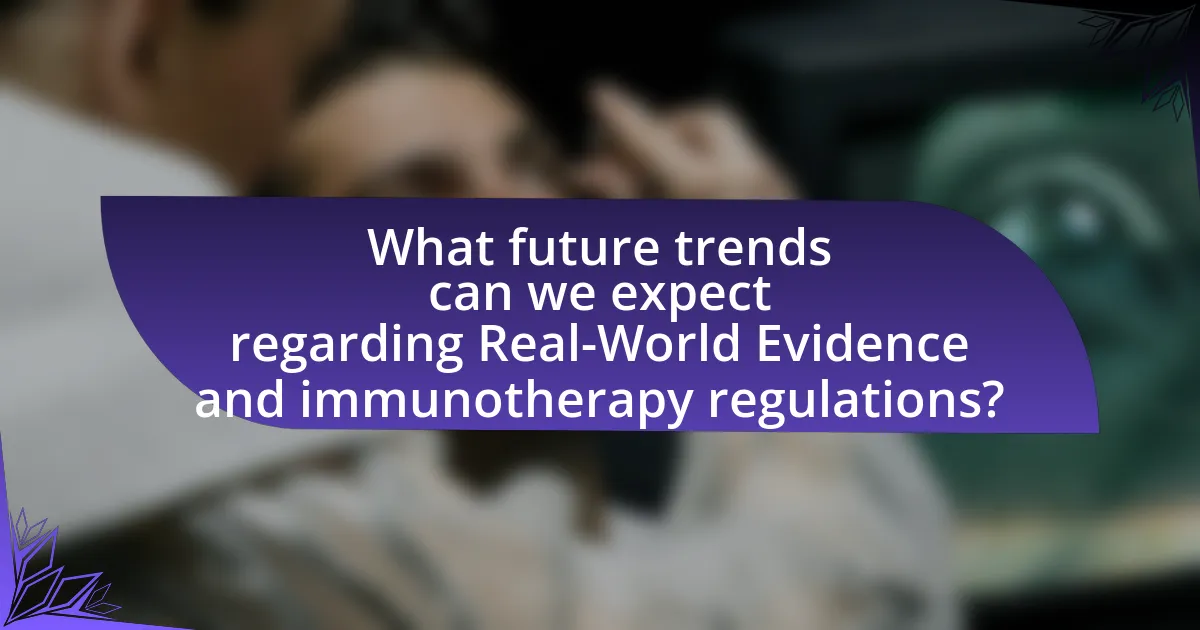
What future trends can we expect regarding Real-World Evidence and immunotherapy regulations?
Future trends in Real-World Evidence (RWE) and immunotherapy regulations will likely focus on increased integration of RWE into regulatory decision-making processes. Regulatory bodies, such as the FDA and EMA, are progressively recognizing the value of RWE in assessing the safety and effectiveness of immunotherapies, as evidenced by the FDA’s 2021 guidance on the use of RWE in regulatory submissions. This trend will lead to more streamlined approval pathways for immunotherapies, allowing for faster access to innovative treatments based on real-world data. Additionally, there will be a growing emphasis on the standardization of RWE methodologies to ensure data quality and reliability, as highlighted by initiatives like the FDA’s Real-World Evidence Program.
How might advancements in technology affect the collection of Real-World Evidence?
Advancements in technology significantly enhance the collection of Real-World Evidence (RWE) by enabling more efficient data gathering and analysis. Technologies such as electronic health records, mobile health applications, and wearable devices facilitate real-time data collection from diverse patient populations, improving the breadth and depth of evidence. For instance, a study published in the Journal of Medical Internet Research highlights that mobile health applications can capture patient-reported outcomes and adherence data, which are critical for understanding treatment effectiveness in real-world settings. Additionally, machine learning algorithms can analyze large datasets quickly, identifying patterns and insights that inform regulatory decisions regarding immunotherapy. This technological evolution not only streamlines the data collection process but also enhances the reliability and relevance of RWE, ultimately influencing immunotherapy regulations.
What role will artificial intelligence play in analyzing Real-World Evidence?
Artificial intelligence will significantly enhance the analysis of Real-World Evidence (RWE) by enabling more efficient data processing and uncovering insights from vast datasets. AI algorithms can identify patterns and correlations within RWE, such as patient outcomes and treatment responses, which traditional analytical methods may overlook. For instance, machine learning techniques can analyze electronic health records and clinical trial data to predict the effectiveness of immunotherapies in diverse populations, thereby informing regulatory decisions. Studies have shown that AI can improve the accuracy of predictive models by up to 30%, demonstrating its potential to transform RWE analysis in the context of immunotherapy regulations.
How can real-time data monitoring improve regulatory processes?
Real-time data monitoring can significantly enhance regulatory processes by providing immediate insights into treatment efficacy and safety. This continuous flow of information allows regulatory bodies to make timely decisions based on current evidence, rather than relying solely on historical data. For instance, during the COVID-19 pandemic, real-time monitoring of vaccine safety and effectiveness enabled swift regulatory adjustments, ensuring public health was prioritized. Such proactive measures can lead to more adaptive regulatory frameworks that respond to emerging data trends, ultimately improving patient outcomes and maintaining compliance with safety standards.
What implications do these trends have for patients and healthcare providers?
The trends in real-world evidence (RWE) significantly enhance patient outcomes and inform healthcare providers’ decision-making. For patients, RWE facilitates personalized treatment plans by providing insights into how immunotherapies perform in diverse populations outside clinical trials, leading to more effective and tailored therapies. For healthcare providers, these trends support evidence-based practices, enabling them to make informed choices regarding treatment options and improving overall care quality. A study published in the Journal of Clinical Oncology found that RWE can lead to a 20% increase in treatment adherence among patients receiving immunotherapy, demonstrating its practical benefits in clinical settings.
How can improved regulations enhance patient access to immunotherapy?
Improved regulations can enhance patient access to immunotherapy by streamlining approval processes and ensuring that effective treatments are available more quickly. For instance, regulatory bodies like the FDA have implemented pathways such as the Breakthrough Therapy designation, which expedites the development and review of drugs that show substantial improvement over existing therapies. This approach has led to faster access for patients, as seen with the rapid approvals of several immunotherapies for conditions like melanoma and lung cancer. Additionally, regulations that incorporate real-world evidence can help demonstrate the effectiveness of immunotherapies in diverse patient populations, further supporting their approval and reimbursement. This evidence-based approach not only validates treatment efficacy but also encourages healthcare providers to adopt these therapies, ultimately increasing patient access.
What strategies can healthcare providers adopt to stay informed about regulatory changes?
Healthcare providers can adopt several strategies to stay informed about regulatory changes, including subscribing to industry newsletters, attending relevant conferences, and participating in professional organizations. Subscribing to newsletters from regulatory bodies, such as the FDA or CMS, ensures timely updates on policy changes. Attending conferences allows healthcare providers to engage with experts and gain insights into emerging regulations. Additionally, involvement in professional organizations, such as the American Medical Association, provides access to resources and advocacy efforts that keep members informed about regulatory developments. These strategies are effective as they leverage established communication channels and networks within the healthcare industry.
What are the best practices for utilizing Real-World Evidence in immunotherapy regulations?
The best practices for utilizing Real-World Evidence (RWE) in immunotherapy regulations include establishing clear methodologies for data collection, ensuring data quality and integrity, and engaging stakeholders throughout the process. Clear methodologies, such as defining patient populations and treatment protocols, enhance the reliability of RWE. Data quality can be ensured by using standardized data sources and validation techniques, which are crucial for regulatory acceptance. Engaging stakeholders, including regulatory bodies, healthcare providers, and patients, fosters transparency and aligns RWE with clinical needs. These practices are supported by the FDA’s guidance on RWE, which emphasizes the importance of robust data and stakeholder collaboration in regulatory decision-making.
How can organizations effectively gather and utilize Real-World Evidence?
Organizations can effectively gather and utilize Real-World Evidence (RWE) by implementing systematic data collection methods and leveraging advanced analytics. Systematic data collection involves utilizing electronic health records, patient registries, and claims data to capture diverse patient experiences and outcomes. Advanced analytics, including machine learning and statistical modeling, can then be applied to interpret this data, revealing insights into treatment effectiveness and safety in real-world settings.
For instance, a study published in the Journal of Clinical Oncology demonstrated that RWE derived from electronic health records can provide valuable insights into the long-term outcomes of immunotherapy in cancer patients, influencing regulatory decisions and clinical guidelines. This approach not only enhances the understanding of treatment impacts but also supports regulatory bodies in making informed decisions regarding immunotherapy approvals and guidelines.
What resources are available for stakeholders to enhance their understanding of Real-World Evidence?
Stakeholders can enhance their understanding of Real-World Evidence (RWE) through various resources, including academic journals, industry reports, and online courses. Academic journals such as the Journal of Real-World Evidence and the Journal of Clinical Epidemiology publish peer-reviewed articles that provide insights into RWE methodologies and applications. Industry reports from organizations like the IQVIA Institute for Human Data Science offer comprehensive analyses of RWE trends and case studies. Additionally, online courses from platforms like Coursera and edX cover RWE concepts and their implications in healthcare, allowing stakeholders to gain structured knowledge. These resources collectively support stakeholders in grasping the complexities and significance of RWE in the context of immunotherapy regulations.
